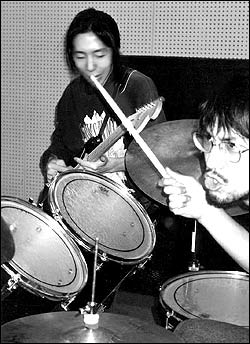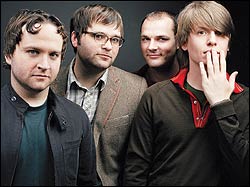The fantasy is as old as Pygmalion and Galatea, but it’s only in the last 25 years or so that it’s been possible to realize—at least on records. It’s a fantasy of a woman made of metal and silicon, the perfect and impossible ideal, as cold as stone, who comes to life but only barely—an inorganic facade cracked just enough to expose the naked, eroticized flesh beneath it. Of course, there are all kinds of creepy subtexts below that: the desire for absolute control or creation of the love object, or the dream of breaking through sexual indifference. What’s interesting, though, isn’t why this particular fantasy is disturbing but why it’s so powerful—why it keeps turning up in pop, and why band after band represents it with very similar musical ideas.
The first major artificial-woman record was probably Grace Jones’ 1980 cover of the Normal’s car-crash-fetish synth-disco song “Warm Leatherette.” (“Quick,” she intoned robotically, “let’s make love/Before we die.”) But it went mainstream three years later with Eurythmics’ “Sweet Dreams (Are Made of This),” mechanically gulping synthesizers accompanied by Annie Lennox singing the choruses like a soulbot and vocalizing orgasmically between them. Propaganda picked up the baton a few years later, especially with “p:Machinery,” a single about being subsumed by an enormous machine, sung by Claudia Brücken as affectlessly as she could manage, except for a few helpless upper-register cries. More recently, Ladytron’s two albums have featured blank-voiced women singing about cracked LCDs and Novotels, accompanied by stiff, blippy electronics. Ladytron’s obvious model is Kraftwerk, whose records hinted at the idea that roboticism could be fetishized, although “The Model,” where they approached it most closely, is actually about a robot lusting after a human woman.
Faking the Books (Morr), the third album by the German group Lali Puna, constructs an artificial-woman fantasy of its own: the first sound on the album is a skipping “aaah,” a fragment of singer/lyricist Valerie Trebeljahr’s singing, isolated in the right speaker. The second sound is also a digitally scrambled loop of Trebeljahr’s voice, this time a bit longer, in the left channel. Finally, her real voice arrives, singing in a half-whisper: “We’ve been done before and now we try to forge ourselves.” It sounds like it’s expressing, with some difficulty, what the two robot loops can’t quite—a soft-focus David Hamilton–style image, performed by a piece of machinery discovering the smoothness of its own skin. Nice word there, too: “Forge” suggests a self both faked and metallically constructed.
Trebeljahr’s main collaborator in Lali Puna is Markus Acher, also of the Notwist; his guitar parts make a lot of Faking the Books sound more like the Notwist, and less like the product of a lone fleshbot, than it otherwise might. Even when the arrangements bust out with a full rock band, though, Trebeljahr sings with a deliberate coldness and emptiness (and more shards of her voice keep landing elsewhere in the mix). “Where do you want to go today?” goes the chorus of “Micronomic,” quoting the Microsoft slogan. Still, there’s a lot of depth to Lali Puna—Trebeljahr’s voice, and its suggestion of artificiality, is one tool among many for the group.
For Neulander, on the other hand, the nearly synthetic tone of Austrian-born singer Korinna Knoll’s voice is the focal point. Knoll half-emotes occasionally on their debut, Smoke + Fire (EFA), but the album’s best moments all involve her letting lyrics drop from her lips like little icicles. Her accent adds to the effect, too—the artificial woman isn’t a specifically German fantasy, but that’s somehow become a conventional component of the setup. Knoll’s partner in Neulander is former Echo & the Bunnymen keyboardist Adam Pierce. (They’re helped out on a few tracks by the Dream Academy’s Nick Laird-Clowes.) The single “Sex, God + Money” finds Knoll taking a stroll (“All the little insects are making love”) and declaring, “I think about sex/I think about God”—she pronounces it more like “cod”—”I’m thinking about money . . . ,” in a voice that suggests she’s definitely not thinking about the first two, and the third one’s open to debate. Her voice is run through the same pitch-correcting software, Autotune, that gave Cher the mechanized sound of “Believe,” and was subsequently used by a dozen other pop musicians.
Smoke + Fire‘s highlight, though, is a slow, warm melody called “Just There”—the Autotuned Knoll doesn’t quite reveal what she’s going on about, but what it sounds like she’s singing in the chorus is “It’s just air, just air.” (What do you humans make such a big deal about it for, anyway?) As he does on most of the rest of the album, Pierce sets up his electronics to pulse like antique synthesizers, if that’s not what they are—the drum-machine track goes thwip-thwip—and idly plays along with them on guitar, as if he’s observing them on a TV set. The fantasy here isn’t just of a lovedroid, but of a retro-chic artificial woman: an ideal frozen in time in the early ’80s, the cultural moment halfway between The Stepford Wives and Weird Science. It doesn’t matter what Neulander’s songs are like, and in fact a lot of them are pretty negligible. The group’s sound carries the weight for them, evoking the instant when it seemed like human desire could be satisfied once and for all by technology, no matter what the cost to actual humans might be.








